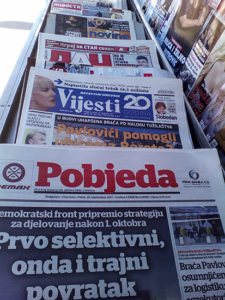Non-compliance with media standards has become a common phenomenon in Montenegro, observed by both the public and journalists alike. Almost every day the media landscape is packed with examples of breaches of the Code of Journalists. Among other things, this is a consequence of the fact that no independent or impartial self-regulatory body exists, meaning the work of the media is not supervised by anyone.
In its recent report on Montenegro, the European Commission particularly emphasized that — alongside the problematic decriminalization of defamation — the number of breaches of the Code of Journalists is high, which “points to problems with mechanisms of self-regulation, as well as challenges in understanding the role of the media.”
According to their estimate, “a certain level of readiness in the field of freedom of expression” has been achieved, but added that there was no improvement in the past year.
A particular issue is that Montenegrin media look more and more like they are a service of politicians and other interest groups, rather than “offering the people information that is necessary for them to be free.”
In almost all media, there can be found examples of non-compliance with journalistic standards, from one-sided and biased reporting to presenting incomplete information. What is especially worrying is the presence of harsh and inappropriate comments with elements of hate speech, which has moved in to news outlets, and is most visible in reader’s comments and on social networks.
No monitoring or consequences for the media
There is no all encompassing regulatory body in Montenegro. One existed up until 2010, when it was abandoned by daily newspaper Vijesti and the weekly Monitor. The Media Council for Self-Regulation (MSS) was founded two years later, which incorporated most Montenegrin media, excluding those who have been seen by the public as “critical of those in power.”
However, soon after the establishment of the MSS, Vijesti, Monitor, and another daily, Dan, which are seen as “opposition media” in Montenegro founded their own self-regulatory body, the Press Council, though it never actually started operations.
Most media that are not MSS members have appointed ombudspersons who closely follow their work, whereas the public broadcasting service, Radio Television of Montenegro (RTCG), has their own self-regulatory body — the RTCG Council for Consideration of Audience Objectives. Though established as early as 2002, this self-regulatory body does not evaluate the implementation of the Code of Journalists by RTCG.
The frequent violations of the Code of Journalists has led to a decline of trust amongst the public, but also generally threatens the dignity of the profession.
The work of the MSS has so far not produced significant results. Even though its founders declared that the body had the goal of “improving and developing media self-regulation in Montenegro, protecting citizens from non-ethical reporting in the media, and raising the level of consciousness on the importance of truthful and timely reporting,” this isn’t really the case in practice. The frequent violations of the Code of Journalists has led to a decline of trust amongst the public, but also generally threatens the dignity of the profession.
It is difficult to change such a situation, especially as the media do not suffer any consequences for such behavior — a claim also made by media editors, who are themselves members of this body.
Bojana Komnenic, the editor of the Antena M radio station and news outlet, told K2.0 that she believes nobody is adequately regulating or punishing the media. “Just as the media struggle with each other to obtain information, influence, and marketing, that is exactly how media regulation is happening,” she explains. “It’s on the level of ‘I’m regulating other’s mistakes, but not my own.’ This is the key barrier for complying with the law. I don’t see a better future in many areas and I don’t see it in this field either.”
Darko Ivanovic, a member of the Council of the Electronic Media Agency (AEM) and a former journalist, believes that the topic of media self-regulation is of immense importance.
“The displaced self-regulation in which every media group has its own body and certain media don’t go farther than their own ombudsperson — it doesn’t create a healthy atmosphere,” Ivanovic states. He points to the distrust and polarization among the media, “which is creating another, more dangerous climate by means of trench fights with contradictory information.”
Ivanovic is certain there are media that are breaking every journalistic standard, and mentions the daily, Informer, which recently ceased publication, as an example. He also points to TV Pink M. Due to an absence of self-regulation, or any regulation at all, Ivanovic suggests that other media are going down the same road.
“This tabloidization, fabrication of immense lies which are often used by the media to target political opponents of the centers of power they are supporting was a characteristic for printed media, but this mire has quickly moved onto electronic media, when Pink M started quoting untruths from the aforementioned Informer,” Ivanovic states. “In an atmosphere in which nobody is clean, the tendency is that everybody is becoming filthy and that this adjustment is reaching limits where news becomes absurd and a pond of slop in which facts are the least important thing.”
According to Ivanovic, in this kind of situation dialogue is of essential importance and insists that only the politicians in power are profiting from the chaos in the media, which is something the government itself allowed to happen.
“The direction in which we should be thinking is that these bodies simply isolate those who constantly break the profession’s code, if they cannot reach their goal by warnings and fines,” Ivanovic claims.
In its report on Montenegro, the European Commission particularly emphasized the need for an effectual implementation of the Code of Ethics in the entire media community, and pointed toward the necessity to strengthen capacities of self-regulatory bodies. The public is unaware of what has been done on that occasion, nor does it seem that serious intentions or concrete steps exist that would lead to fulfilling these recommendations.
Media in the service of citizens
The Montenegrin media landscape is divided on a political basis above all. It is known which media have close ties with the ruling coalition, and which are opposition-oriented. According to Marijana Camovic, an experienced journalist and president of the Media Syndicate, those employed in the media are being limited in doing their job by different political and business interests of media owners.
"Media literacy of citizens is needed. If they obtain this skill, and if they can properly put events into context, then they can separate political inclinations from news."
Marijana Camovic, journalist and Media Syndicate president.
“If citizens want to be objectively informed, it is difficult for them to achieve this if they are informing themselves only through one media,” Camovic told K2.0. “Media literacy of citizens is needed in order to do this. If they obtain this skill, and if they can properly put events into context, then they can separate political inclinations from news. The media are surely responsible, the state of the market isn’t organized properly, and that’s why the media find themselves in the situation of having to adjust, which often is at the expense of quality and objectivism, since making compromises has its cost.”
The role of the media is certainly not to serve individual interests. Camovic particularly emphasized that the media should not be a weapon in anybody’s hands, while this is precisely the situation in Montenegro. She adds that media often break many laws, and that it is necessary to change this.
“The Labour Law must be complied with, taxes must be paid, the competition must be fought with fair means, not taking out dirty laundry and mudslinging, “Camovic said. “Cases of assaults on journalists and the media must not be resolved in a way that we will leave them to become obsolete, government money should not serve to keep certain media alive through advertising, journalists must be free in their work and editorial staff should protect them, not obstruct their work, self-regulation isn’t a punishment, but it is being understood in exactly this way.”

Photo: Sanja Rasovic.
The most recent report on media self-regulation in Montenegro was published by the NGO Action for Human Rights which has continually followed the work of the MSS and the media. Their monitoring has determined that violating standards is a common practice of Montenegrin media, and that the biggest media failure is one-sided reporting.
The same result is shown in the two-month analysis conducted by the NF Civic Alliance during the election campaign for parliamentary elections in 2016. One of the organization’s findings during this period was that more than half of media texts were one-sided, and that the media were openly categorizing themselves on either the side of the government, or the opposition. Even though this issue was more noticeable in printed media, TV media were not lagging behind, and almost every third media report was described as one-sided.
“The media have very clearly sided with certain political parties and coalitions, thereby objectively jeopardizing the informing of public which is actually the purpose of their existence,” NF Civic Alliance said in a report. “In the course of the election campaign, it may be concluded that the media have expressed unprofessionalism by offering limited and politically coloured information on the election process.”
Online insults
Hate speech appearing online is another pressing concern. Bojana Komnenic from Antena M believes it mostly appears on news portals.
“During my many years of working on a portal, I have come to realize that only a few Montenegrins know how to express their own attitudes, and not to criticize in the most terrible, threatening, and insulting manner,” she told K2.0. “This is most visible of course through comments. There are certain media that advocate for hatred against certain social groups or notions by means of their own texts. This leads those who narrowly observe things to feed their hatred and prejudices.”The most common insulting comments with elements of hate speech refer to religious, national, and sexual orientations.
Komnenic explains that it is difficult to eradicate such instances. One of the ways to see the end of this, according to her, may be the introduction of more strict rules for commenting.
“It would most certainly be interesting if there was a more rigorous log in for comments on certain portals, one where commentators would have to have their name and surname, their IP address, next to their threats and hatred. If this doesn’t work, then I truly believe that our society is not fit for an argument-based appropriate correspondence,” she said.
The Council of the Electronic Media Agency shares a similar opinion. Ivanovic believes that there have been too many unpleasant messages that call for hatred. The Council adds that this cannot be justified by freedom of speech and opinion.
“Encouraging media to accept the pre-regulation and sanction the spreading of hatred is the right way. Raising capacities and introducing stricter fines,” Ivanovic concludes.K
Feature image: Sanja Rasovic.


